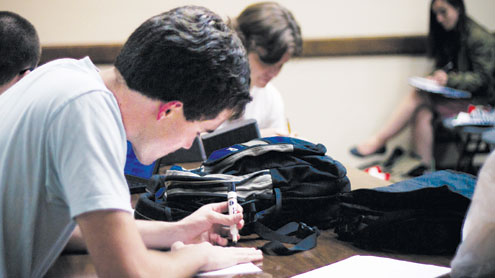It’s the weekly meeting of the student literary group the Inklings, and club president Will Gillette stands in front of a handful of other bookworms. They’re busy muttering lyrics and scribbling them in their notebooks. Tonight’s topics: Nintendo and murder. Gillette is teaching them how to rap. Gillette looks more like an English major than a gangsta. He’s tall and thin with dark, curly hair that sits neatly aloft his clear, cheerful face. He has the temperament of Mr. Rogers and his diction would put an elementary school grammar teacher in tears. But at the mic, he’s “The Wildebeest,” and in the hands of The Wildebeest, the English language turns to putty. He brings his raps to contests around Alabama, rattling off the rhymes, associations and double-meanings that have twisted the life out of proper syntax since his first rap battle in high school. “It’s kinda confessional,” Gillette said about his style. He calls it “bohemian.” His lyrics are introspective and philosophical, full of figurative language and complicated images, but this is rare in the South. He describes most local rap as “southern-fried.” “Southern-fried is just people spittin’ about social issues, problems with the government, poverty,” he explained. “I try to incorporate some elements of southern-fried just so I can get higher scores…but I never compromise the integrity of my poems.” There isn’t much of a competitive rap scene in Tuscaloosa, but Gillette performs where he can, appearing at various open-mike nights, poetry slams and spoken word competitions around Tuscaloosa and Birmingham. The events are small, and the prize is rarely more than a few hundred dollars, but the community is tight. Gillette’s most recent competition was at the Hawk’s Place in Tuscaloosa. “I didn’t know anybody, and they called me over and I just sat around with the other poets,” he said. ”I didn’t feel like I was the only white person there, I just noticed it when I looked around.” But Gillette feels less at home with the judges. They’re not necessarily experienced in rap, and Gillette says sometimes they judge based on what they think rap ought to be, not from a real understanding of the art. “The other poets appreciate your work way more than the judges,” he said. “It’s unfortunate, but usually the judges who are there haven’t been to my other competitions and want the run of the mill spoken word.” Abe Smith coordinates and judges Slam at the Bama, a poetry competition held in the Bama Theatre. He said artists often come with a hip-hop sound, but the competition is open to all varieties of poetry. “That’s the whole point of a poetry slam, that it brings in all types of listeners from all different backgrounds,” Smith said. “Ultimately in the best work, everybody recognizes it as the best work even if they haven’t had a history of listening to that type of work.” But when it comes to judges, Gillette says his biggest disadvantage is his race. “There are stereotypes about what spoken word should and should not sound like. When they hear white people perform, they dismiss it more readily…they think, ‘I could do this.’” Gillette grew up in the suburbs of Birmingham. He got his first taste of rap watching MTV before his mom came home from work. He says rap was foreign to his background, and today his background is largely foreign to rap. “I had it pretty easy growing up,” he says. “I’m not going to pretend like I didn’t.” But for Gillette, rap isn’t about race or culture, it’s about being heard. “I had written poetry, and I wasn’t satisfied with the reception. I wanted to entertain. Nobody wants to sit around and listen to someone read poetry.” Adella Smith, a member of the Inklings, said that rap is just a part of who she is. “Seeing him as a teacher was different, but that’s how he is all the time,” she said. “Just trying to share something.”
Categories:
Bama student finds expression through spoken word
November 1, 2011

More to Discover








